Beer as a Companion of Civilization - 1907
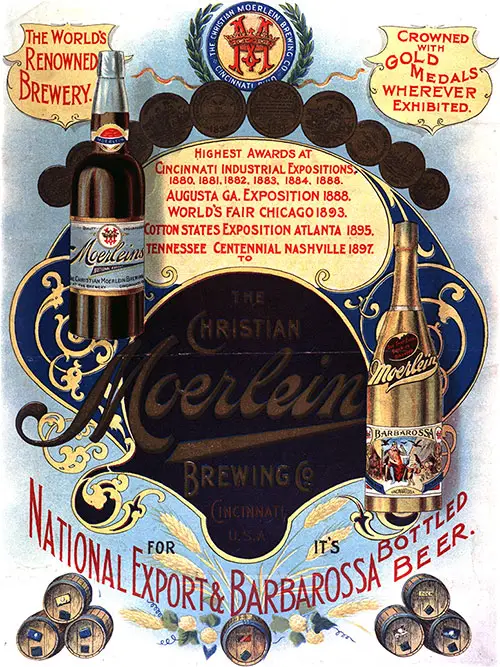
Barbarossa Bottled Beer © 1902
Beer follows the flag of civilization. It is drunk to the greatest extent per capita in thickly populated, highly civilized communities, and to the smallest extent per capita in sparsely settled, uncultured communities.
Where industry, arts, science and letters are furthest advanced, there is the drinking of beer most prevalent. In wild, uncouth countries, among the lumber and logging camps, in the isolated mining districts, and among the savages, whisky and other highly intoxicating beverages are drunk to the greatest extent and beer is almost unknown.
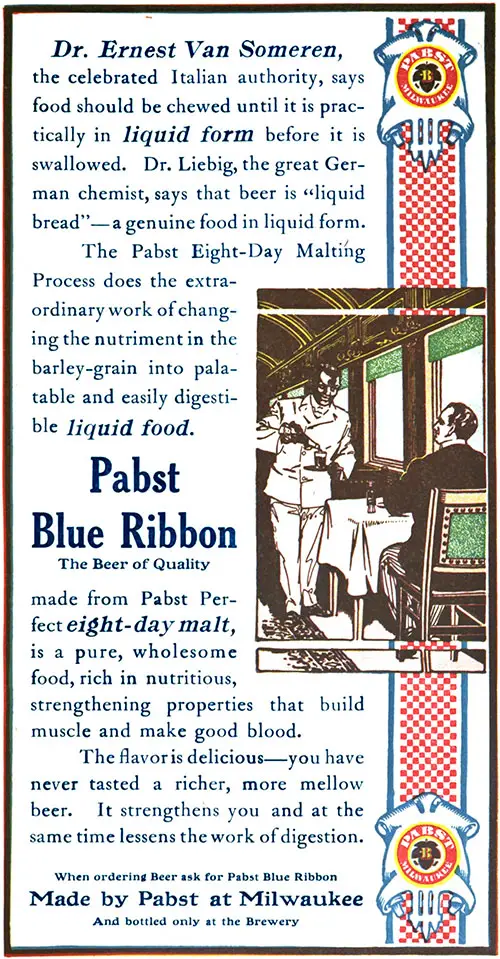
Pabst Blue Ribbon - Beer of Quality © 1907
Last year the United States consumed more than fifty-four million barrels of beer. To be exact the consumption was 54,651,637 barrels, which is twenty-one times as much as it was in 1863, or forty-three years ago, when the taxing of beer for war revenue, gave the first accurate statistics of the annual consumption and the amount of beer drunk then was 2,596,803 barrels.
As we have three times the population in the United States now that we had then, it shows that the average American is drinking seven times as much beer today as he did forty-three years ago. Each person in America, including men, women and children, drank an average of twenty gallons of beer last year.
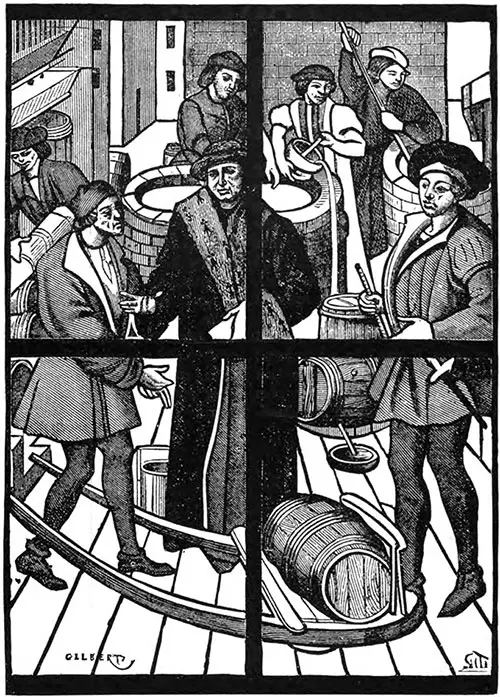
"THE BREWERS." - Ancient Stained Glass Window in Cathedral of Tournai, France. © 1901 One Hundred Years of Brewing
The countries furthest advanced in civilization are England, France, Germany and the United States. These four countries are the furthest advanced in the taste for beer. Great Britain and Ireland last year consumed 50,001,109 barrels. Ale and lager are both known as beer when the term is used in a general way, and hence the figures given here include both these beverages.
England Leads the World
England ranks first among the nations of the earth in point of per capita consumption of beer and ale; Germany ranks second; the United States third, and France fourth. This is probably the standing of the four nations in their rank of world's powers.
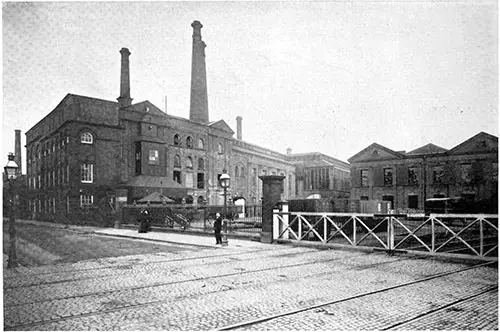
Allsopp's Brewery — Vlew of Old Brewery and Lager Beer Brewery © 1901 One Hundred Years of Brewing
France consumed 10,100,101 barrels, which is equivalent to about eight gallons for each inhabitant. This is a much smaller proportion than in the other three great nations, but it is much more than equalized by France's enormous consumption of mild wines, which rank next to beer as a temperate and exhilarating beverage.
France consumes about 700,000,000 gallons of wine a year, or nearly twenty gallons for each inhabitant. This greater consumption of wine than beer in France is not to be wondered at, for France is a nation of vineyards, and wine there is as cheap as beer.
Wine, ale and beer belong in the same category, for each is a fermented beverage, and none has the ill effects of the distilled beverages, all of which possess a high percentage of alcohol.
Beer, however, is a much milder beverage than either ale or wine, and much more healthful. The time is near when even France and England will discard their wine and ale for lager beer, for its popularity in both these nations is growing by leaps and bounds.
The per capita consumption of beer in England is nearly forty gallons. That Is, each person in England drinks about forty gallons of beer and ale a year. In Germany, the beer consumed last year amounted to 60,112,008 barrels, which was an average of thirty gallons for each inhabitant.
In certain of the more populous districts of Germany the per capita consumption is far in excess of this. For Instance, in Bavaria, the average amount of beer drunk by each man, woman and child is sixty-two gallons a year; in Wurttemberg it is forty-seven gallons, and in Baden it is forty-two gallons.
Whisky should never be taken except for medicinal purposes, and then care should be used to secure the purest whisky.
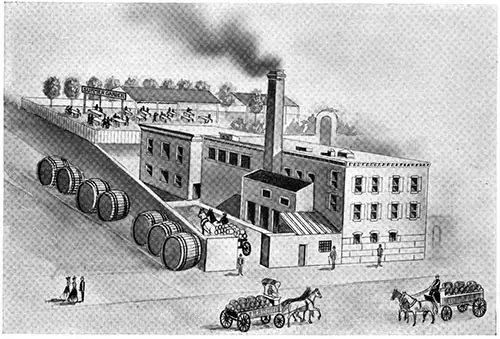
Keystone State Brewery, Philadelphia (Foundbd 18l9). © 1901 One Hundred Years of Brewing
Beer's Benign Blessings
Beer, the beverage of bright Bohemia, brings bounteous benefits and blissfulness. Whisky, the wabling, wallowish was sail of the wild and woolly West, wreaks wretchedness, Woe, want and wantonness.
Yes, beer is the beverage of "Bohemia." It is drunk by the college student, the professor, the writer, the artist, the skilled artisan, the musician and the skilled in all crafts.
Whisky is the drink of the wicked. Wherever crime prevails, there will be found the drinking of whisky. It is the beverage of the murderer, the thief, the highwayman, the dissolute woman and the evil of all classes.
The Wicked Ways of Whisky
There is born in the savage breast a craving for whisky or other distilled spirits. The taste for beer comes with modern cultivation. There has never yet been found a wild or benighted race of people who did not take to whisky as a duck to water.
Every ship that sails for darkest Africa carries with It a cargo of grog, which is eagerly sought by the uncivilized blacks who drink It to intoxication and thereafter revel in most disgraceful orgies.
Many centuries of total abstinence have not cured this craving for intoxicants, but to the contrary seems to have intensified it. Whisky has done more toward exterminating the American Indians than all the other causes combined.
The few members of the tribes who yet remain in the Indian Territory drink whisky to such an extent that the government has been forced to interfere, and now it is a penitentiary offense for any person to carry whisky Into the Indian Territory.
Of course, it has never been found necessary for the government to place any such restriction on beer, for beer goes hand-in-hand with progress and advanced civilization, while whisky precedes destruction.
Wherever there is an increased consumption of beer there is a decreased consumption of whisky and a lessening of Inebriety.
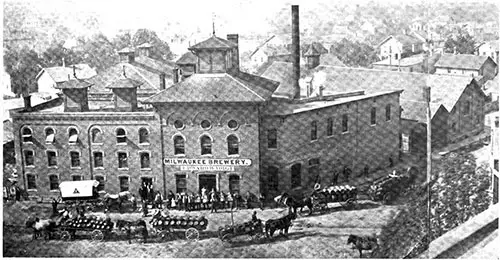
E. W. Voigt’s "Milwaukee Brewery" - Detroit in the 1870s. © 1901 One Hundred Years of Brewing
Beer as a Temperance Beverage
Beer's mission in the world is to gradually replace the stronger, more injurious distilled beverages. It is the product of ages of study and scientific endeavor toward this very end.
A thousand years of experimenting and research in Germany and America have produced the modern beer, the most perfect and the most healthful beverage known. It comes nearer giving the effect of exhilaration without the bad after effect than any other drink in the world.
It is an improvement on the ale of England and the acme of perfection in the brewing of malt liquors. The person who learns to drink beer does not care for strong drinks. In the German districts, where each person drinks from two to three times as much beer as in America, there is not half the drunkenness there as In America'.
The same is true of England, where the inhabitants drink twice as much beer or ale as do the Americans. In Germany it is considered no more improper for young girls to go together or alone and sit down at a beer table and drink one or more glasses of beer than for girls in America to drink beverages at the soda fountain.
Everybody in Germany drinks beer. No one there regards it as intoxicating. In the beer drinking places of American cities there is no drunkenness. No more or derly places can be found than the great concert gardens of Chicago and New York, where people assemble by the thousands in the summer time to drink beer and listen to the classical musical programs rendered by the finest orchestras of the world.
The same is true of numerous other resorts where beer forms the principal beverage. On the other hand, in the low resorts of Chicago's West Side and of New York's East Side, and in the Tenderloin district of both those cities where cocktails and other whisky concoctions and champagne form the principal beverages, can be found the homes of crime.
There lives the hold-up man, the confidence man, the burglar, the disreputable woman and the worst classes of civilization. Conditions are about the same on the frontiers and at the mining camps. The person who learns to drink beer does not care for whisky or other distilled drinks.
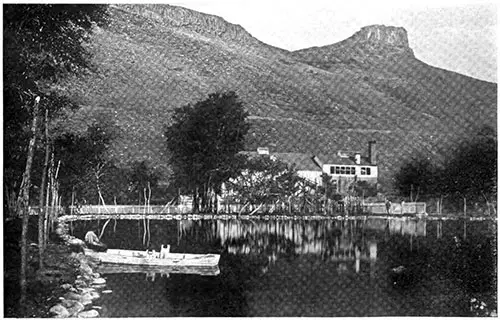
Brewery or A. Coors. Golden, Colorado - 1873. © 1901 One Hundred Years of Brewing
Only Affects Weak Minds
Rightfully beer cannot be considered intoxicating. The person of strong mind could not drink enough of it to make him intoxicated. Only those of the weakest minds ever get drunk on beer.
Of course, such persons, like any other mental weaklings, cannot expect to Indulge in all the pleasures of the strong-minded person. They are mentally incapacitated and should never drink beer.
Beer contains the smallest amount of alcohol of any exhilarating beverage known—only 4 per cent. In other words, in a glass of beer there are twenty-five parts of water to one of alcohol, and even this one part is so softened, and diluted and chilled as to have the smallest possible effect.
A teaspoonful of patent medicine often contains more alcohol and other injurious drugs in it than a whole barrel of beer. Whisky contains 50 percent or more of alcohol; rum 72 percent; claret 9% percent, and cider 6 percent.
How Inconsistent are some temperance people who think it is perfectly proper to drink cider, but very immoral to drink beer. Mr. W. A. Lawrence, a recognized authority on beer, has this to say of the ameliorating effects on the alcohol through the method of producing beer:
"In alcoholic beverages the higher the temperature at which the alcohol or any beverage is produced during fermentation or to which it is raised after fermentation, the more rapid the stimulating effect of such beverage on the human system.
"And, conversely—in alcoholic beverages, the lower the temperature at which the alcohol of any such beverage is produced during fermentation and kept after fermentation, the more gradual and milder is the stimulating effect on the human system.
"In distilled liquors the alcohol is usually and mainly produced by what we may call a 'warm' fermentation of, say from 60 to 70 degrees F., and then the alcohol is subjected to a heat, say from 180 to 200 degrees F., during distillation.
"The quick and sudden stimulus produced by the various brandies distilled from the alcohol of fermented fruits, and of the various whiskies distilled from all sorts of grain, is a matter of common experience, and renders these distilled liquors most valuable In medicine, in war, in 'prohibition' states and counties, and in all other cases of emergency, where, according to The Scriptures, we are bidden to 'Give strong drink unto him that is ready to perish.'
"Turning to the undlstilled and simply fermented beverages—wine, ale and lager beer—we find that sherry wine, which Is ripened by the vintner at a temperature by preference of 100 to 120 degrees F., the highest ripening heat of any wine, stands at the top of the list as the strongest of wines, with a percentage of alcohol, usually, three times as high as lager beer, and with a fiery 'tang' to it that tells of heat and shows why the sherry glass is the smallest of wine glasses.
"Coming to ale, which is fermented and usually kept at a temperature almost twice as high as is lager beer, we find that ale is correspondingly stronger in alcohol than lager, a good 50 percent stronger on the average."
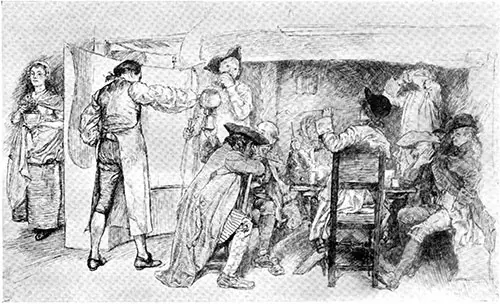
Colonial Ale House © 1901 One Hundred Years of Brewing
Shows Increasing Moral Tastes
Thus It Is clear that it Is not the alcohol in beer that makes it so popular; it is not because of its intoxicating effect that beer is crowding out almost every other kind of drink in civilization.
If people wanted intoxicating beverages, they would drink something else. Therefore, the taste for beer shows a growing temperance and moral disposition that ought to be encouraged, rather than opposed.
Beer is the most healthful of all beverages. I have seen men developed by it from weaklings to strong, robust specimens of manhood. I have known it to cause frail women to put on flesh and grow rosy-cheeked and healthful and take on new leases of life.
Show me stronger women or heartier men than the beer drinking Germans and I will show you other people who drink beer.
Beer destroys the germs of disease and is the greatest protection against pneumonia, typhoid fever, and other contagious infections. It is soothing to the nerves, restful to the muscles, helpful to the digestive organs.
Nothing so revives and resuscitates a person who is tired from physical or mental labor. It Is the best tonic for nervousness and a positive cure for insomnia. One or two glasses before going to bed produces quiet, restful sleep. Beer is food and drink combined.
Here is what Herman A. Schalk, President of the Scientific Station for Pure Products, has to say: "Beer must be regarded as an ideal beverage., not only on account of its refreshing and stimulating qualities, but more particularly since it is recognized that It constitutes a valuable article of food. Its nutritive value must be ascribed to its well-balanced composition.
In addition to a small proportion of alcohol it contains considerable amounts of extractive matters, consisting largely of the soluble carbohydrates and the readily assimilable albuminoids produced by the diastatic and proteolytic actions of the malt. Besides these substances the extract of beer contains certain mineral salts which likewise play quite an important role in our nutrition.
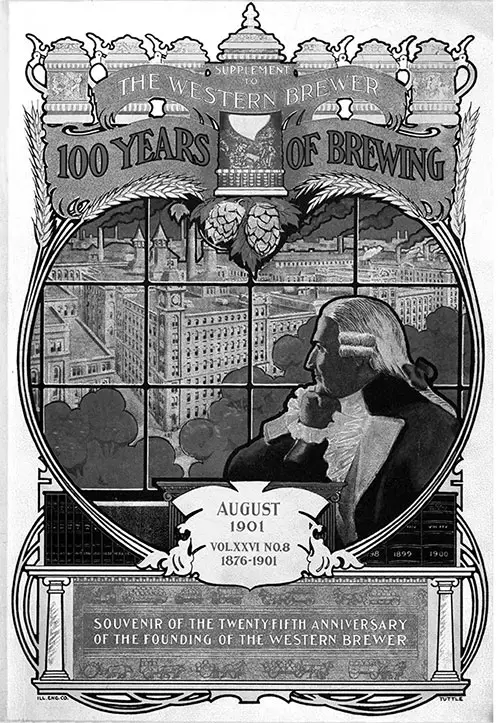
Souvenir of the Twenty-Fifth Anniversary of the Founding of the Western Brewer © 1901 One Hundred Years of Brewing
Closely Allied to Milk
"Beer is adapted to the organism of the adult in much the same way as milk is to that of the infant. It is truly remarkable how closely beer, and particularly our American beer, agrees in regard to the nutrients it contains with that most Important of all foods, milk.
This is very clearly shown in the following comparison of the more Important constituents of milk and beer:
AVERAGE COMPOSITION
Milk— P. C.
- Water 89.79
- Total Solids 12.21
- Milk Sugar 4.18
- Fat 3.74
- Proteids 3.72
- Aah 69
Domestic Beer— p. c.
- Water 87.29
- Original Extract 12.71
- Sugars and Dextrins 3.27
- Alcohol 3.92
- Protelds 48
- Ash 25
Hence there is a reason for this mighty consumption of beer by the world's civilized nations. The world drinks about seven billion gallons of beer a year. Surely the world is not so vile as to do this if it were wrong.
But Impure Beer is Poisonous
The beer I have had in mind in this writing is pure beer. But I regret to say that all beer is not pure beer. And herein lies the greatest ground for the contention of the temperance advocate.
There is no denying the fact that there is some cause for their contention; there is no denying the fact that some beer is harmful; no denying that some beer has most disastrous effects on the drinker and is a source of crime and degeneracy.
In this field where grow the weeds of adulteration and imitation the temperance advocate mistakes the growth for that of the pure and real product of the legitimate harvest.
If these rank growths could be weeded out and only pure beer permitted to remain, there would be no cause for the opposition to beer drinking. But the product of these weeds is drunk for beer, and it is a fact that it is most harmful and even poisonous.
It is a hurt to the entire brewing industry that some vile beverages are permitted to disguise under the names of beer. Some of it is almost entirely a chemical composition, made of chemicals and water, that has. scarcely a resemblance to pure beer.
Why people will drink it is a mystery. Its watery body, and its chemically-produced artificial foam is readily detected, and its taste is enough to turn the stomach of the strongest appetite.
Salicylic acid is the main secret by which these vile concoctions are manufactured. Burned sugar (caramel) is added to give color; coculus indicus to supply an intoxicating agent which will give an appearance of strength to the beverage; quassia to impart bitterness in place of hops; grain of paradise and cayenne pepper to communicate pungency; coriander and caraway seeds to yield flavor; licorice, treacle and honey to supply color and consistence. To stale beer there is sometimes added green vitrol (sulphate of iron) or alum and common salt, which, when agitated with the beer communicates a fine cauliflower head.
Has Caused Many Deaths
Beer sold in some of the low resorts of American cities is absolutely poisonous and has undoubtedly caused many deaths.
The national pure food law has no effect in preventing its sale, for such beer is always made at some nearby establishment in the same state. The national food law has no bearing on products sold in the same state in which they are manufactured.
Most of such beers are sold on draft, but some are sold in bottles either bearing no label at all or bearing the label of some unknown or little-known brewery.
Of course, such places are frequented by the lowest classes of humanity, and those who sell them the beer probably reason that they would not be much worse off if they were poisoned.
But a great deal of beer that is almost as vile often makes its way into the workingmen's saloons and sometimes into the home. All such beers are manufactured at small local breweries and no reputable concern would risk its reputation by putting such vile and poisonous concoctions on the market.
The person who is not careful to specify the brand of beer he desires is very apt to be treated to a dose of these chemical compositions, that is. if he is not patronizing a high-class place which is known to handle only the best brands.
Hundreds of small establishments, calling themselves breweries, are scattered about in all sections of the big cities, and from these the chemical compounds are poured forth in wholesale quantities and sold to dealers at prices little above what they would have to pay for pure water.
Of course, the concoctions never go outside of the state in which they are made, for then the national food law would interfere, but by standing in with state food officers and confining their trade to their own state they experience little difficulty and amass fortunes from the sale of their spurious and poisonous imitations.
Consumer Should Use Great Care
It cannot be urged too strongly upon the consumer to be careful in choosing the brands of beer he cares to drink, and to see that he is given the kind he calls for.
So widely advertised are the pure and wholesome beers made by establishments that take pride in their products and are ambitious to maintain their reputation and improve their products to the highest possible degree of excellency that there is little excuse for a person's being imposed upon if he will exercise a moderate degree of care.
These reputable breweries ship their products to all parts of the world. They must be pure, not only to comply with the national food law, but with the laws of the various states and nations to which they are shipped.
But while there is a great quantity of the most harmful of beverages sold in the United States under the name of beer, this country also has earned the distinction of producing the purest and best beers in the world. Here are located the greatest breweries in the world.
Even Germany, the father of beer, has been surpassed by the American brewer. Every American is familiar with the beers that have made Milwaukee and St. Louis famous.
In these cities the brewer's art has reached the highest point of efficiency. It is becoming so that brew masters of any part of the world cannot consider themselves educated in the brewer's art until they have visited these cities and studied the conditions there.
Paul Orr, “Beer As A Companion of Civilization,” in What To Eat, Book 22, No. 5, May 1907, p. 183-187.
Illustrations from One Hundred Years of Brewing: A Complete History of the Progress Made in the Art, Science, and Industry of Brewing in the World, Particularly During the Last Century, Chicago: H. S. Rich & Co., 1901.
